Engineering solutions at the border
Three young women decided to use their skills to save lives in Mexico and formed Solidarity Engineering.
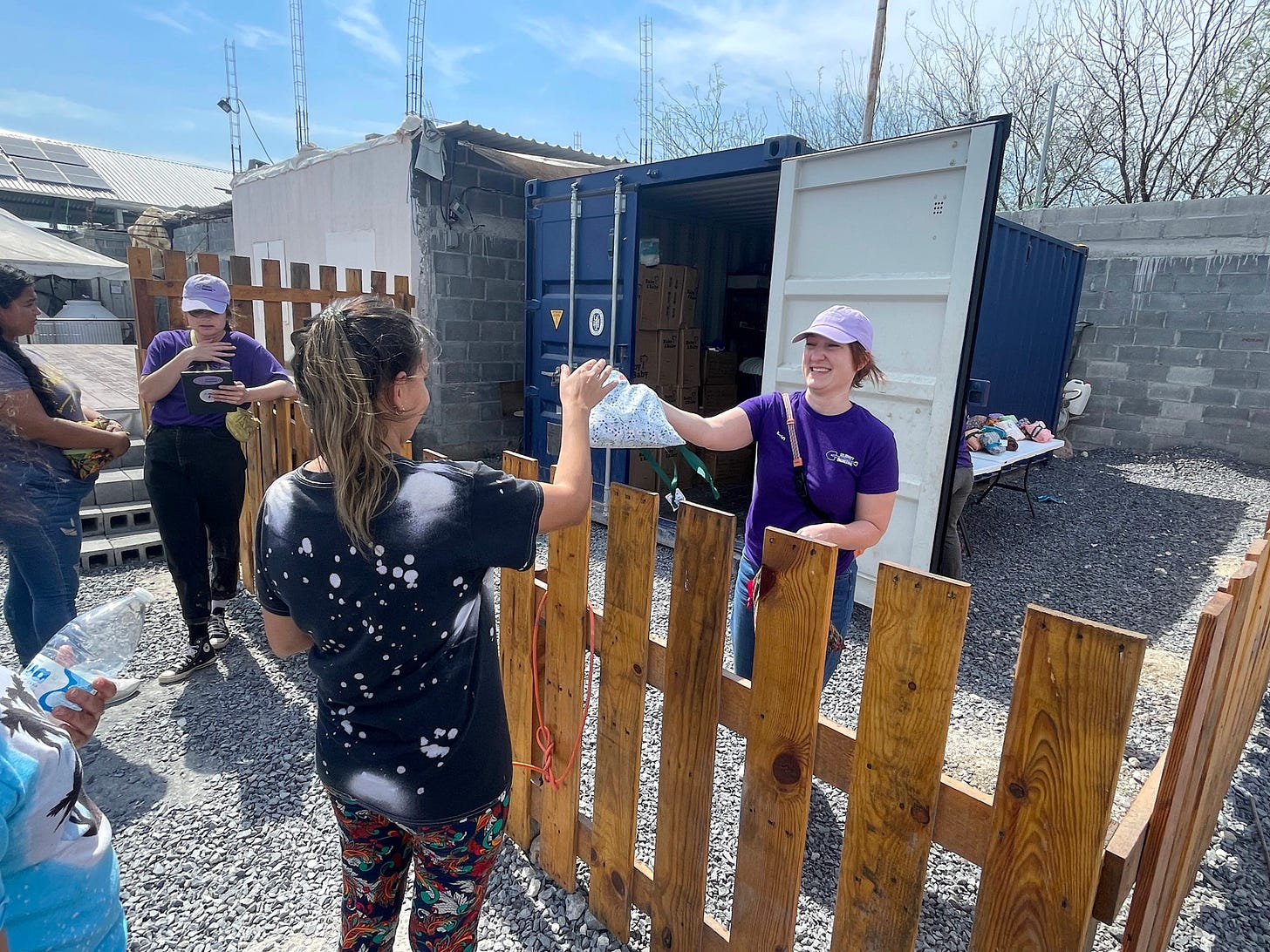
Back in November 2019, three young women who didn’t know each other and lived in different parts of the U.S. all happened to listen to the same podcast that changed the trajectory of their lives.
That episode of “This American Life” titled “The Out Crowd” about a migrant encampment in Matamoros, Mexico, spurred these women to disrupt their lives, go to the U.S.-Mexico border and put their engineering skills to work.
In the podcast, a nurse laments the cycle of diarrhea, tapeworm and other gastrointestinal issues among the 2,500 men, women and children forced to defecate in the open and bathe in the Rio Grande while stranded at the border under the former administration’s “Remain in Mexico” policy.
The nurse told the interviewer that she’d have to Google how to filter water to figure out a potential solution.
Listening in the U.S., Erin Hughes, Chloe Rastatter and Christa Cook all had the same reaction — “I can help with that.”
So in the midst of the COVID-19 pandemic in 2020, Erin, Chloe and Christa uprooted their lives, met for the first time at the border and later that year formed Solidarity Engineering.
The not-for-profit started out by providing safe water and sanitary bathrooms, using the concept of WASH — Water, Sanitation and Hygiene — but quickly expanded to building shelters and playgrounds, teaching STEAM classes and coordinating with other NGOs saving lives on both sides of the border separating Texas and Tamaulipas, Mexico.
I spoke with Erin by phone recently during a break from her grant-writing duties. Here are excerpts from our interview, edited for length and clarity.
Can you explain the focus on WASH (water, sanitation, hygiene) in your work in Reynosa and Matamoros?
These encampments and shelters are not like official refugee camps that are sanctioned by the U.N. There's really not too many larger international organizations that are there. So it’s all these small grassroots organizations that get involved — some church groups, several NGOs like Team Brownsville, Angry Tias and Abuelas and the Sidewalk School. These are small orgs, and there are thousands of people who need help.
The WASH started because of health concerns. When people don't have a dignified, safe, functional place to bathe or go to the bathroom or wash their hands with soap or have diapers for their kids or menstrual pads, it adversely affects their health. People will get infections or GI issues, which really drives us. By providing clean drinking water, sanitary bathrooms, soap and running water, you can really get ahead a lot of the issues. It started with WASH and WASH is definitely our backbone.
Solidarity Engineering has gone beyond that, though, with shelters, playgrounds, parks and other projects, hasn’t it?
We did a playground at Senda de Vida 2 (Path of Life), one of two shelters Solidarity Engineering helped build in Reynosa. We’re currently starting a new park at Senda 1. We’ve expanded (but) WASH is our first priority, and our second priority is infrastructure. We have a solar charging station, and we’ve done a roof/shelter project to keep people out of the crazy hot sun. Right now we’re building a small kitchen area in the Rio camp so that folks aren’t cooking in their own tents, creating a fire hazard. The playgrounds and play are my favorite part because they’re just so fun.
We teach STEAM classes, we also do community surveys to keep an eye on all of our projects to make sure things are working as they should and get feedback through community surveys and women’s group meetings, stuff like that. So we’ve fallen into this role of doing way more than WASH.
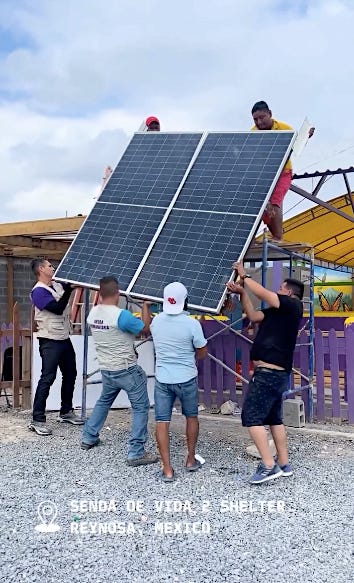
It may come as a surprise to some people that there is a link between engineering and humanitarian work. What would you say to them?
The whole idea of combining those and creating a humanitarian engineering field is so new, and we've been working with some universities — the University of Colorado-Boulder, Drexel University, Villanova. They all have these very new programs, but essentially, humanitarian engineering is this new kind of field.
It's cool that we're really the only engineering organization that I know of at the U.S.-Mexico border. And it's a small world, we kind of know who's working where. It's such basic stuff, you know, providing clean water and bathrooms, right? It's not hard. Everyone knows that it needs to be done, and having the engineering background is helpful, but it's really not so necessary all of the time.
But I've seen some of your videos and photos on Instagram, and to me it looks pretty elaborate and complicated.
Some of the projects, yeah, like the water tower we did was kind of cool. That was definitely pretty engineering focused. There's a few projects where we definitely use our engineering brains, but I think the first priority is always just the humanitarian stuff. Water is a perfect example, right? Everyone needs clean water. And building a water distribution system at Senda 2 was really cool and really fun, and we got to be engineers about it. But at the Rio camp, you can't really build a permanent distribution system. We just bring in tanks and we pay a water tanker truck to come and fill them and there's no engineering involved in that, but it's bringing in water.
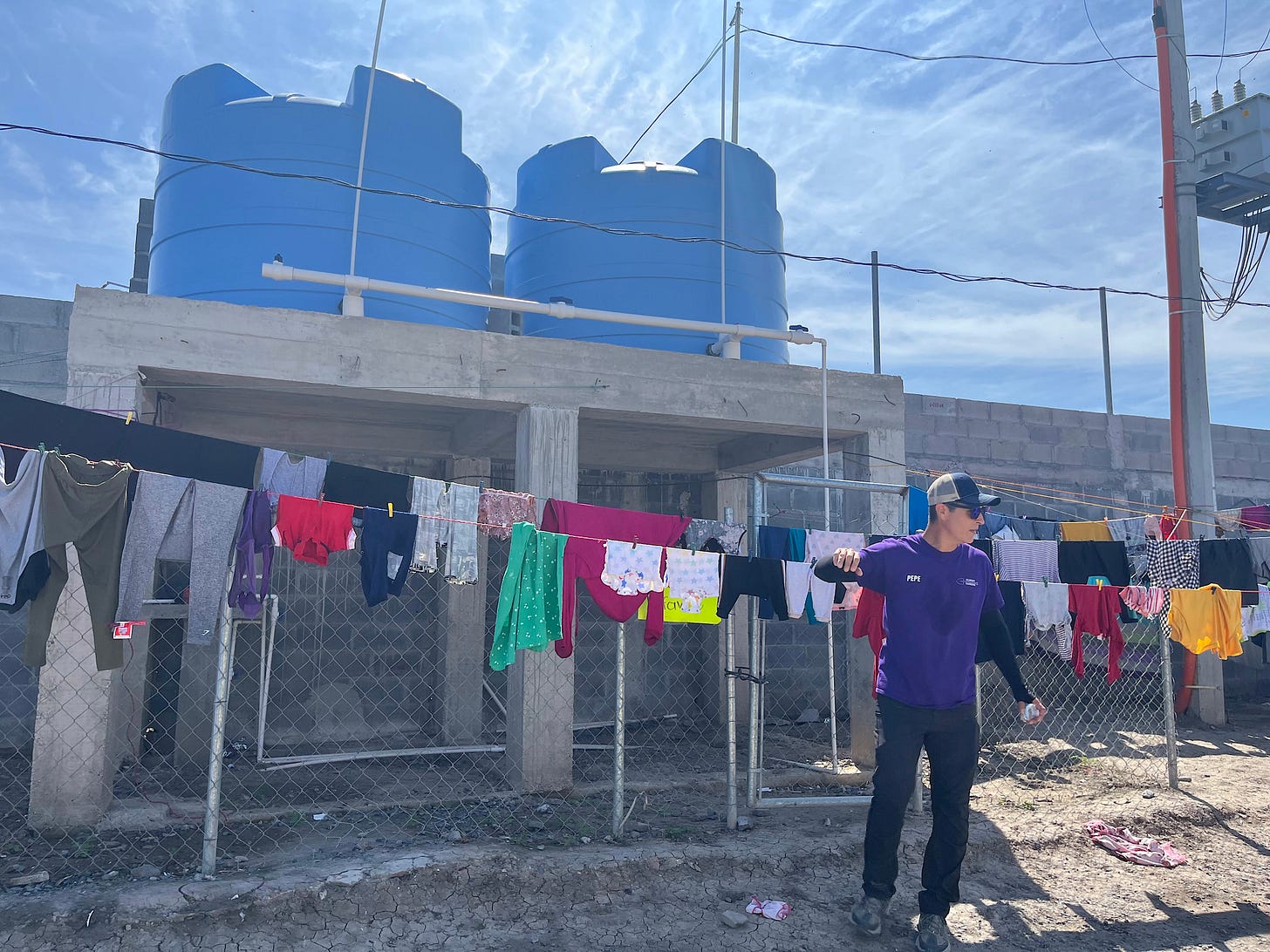
The Solidarity team has evolved quite a bit from the original three women, hasn’t it?
We’ve got seven staff members and a handful of rotating volunteers. So, for example, this summer we have two full-time practicum students that have been helping us, plus three remote volunteers that are very active. And then there’s random folks that pop into meetings and will help with designing the playground for maybe a month, so we definitely rely a lot on our volunteers. (Note: Erin and Chloe spend part of the year at the border and also work remotely at their homes in the Northeast; Christa left Solidarity Engineering about a year ago for another engineering position).
What do you tell loved ones about the dangers — real or perceived — of working at the border, especially in Reynosa?
That's one thing that is a constant struggle. Like with me personally, I recently had a baby, so it kind of adds this new layer of, it's not just me anymore, you know, and so I need to be considerate about my family and what I'm doing. And it's really hard when your team (takes risks). So we've got a few full-time Mexican staff who live in Reynosa, and they go into the camps every day.
But for example, this August we've got a big initiative for menstrual health and menstrual hygiene and convening women's groups. And we've got a group of Canadian women that have been putting together this agenda and have been working really hard on this project and, and they all want to go down. I have to be really frank with them about the risks. You have to make your own decision, if you’re really comfortable going. It’s hard. Every time I send someone, I’m nervous. We do have security protocols, they share their location and I’ll remotely track them. We wear our Solidarity Engineering hats and shirts, and have magnets for the car.
There’s always the risk, even if the cartel is not targeting you. Where we work, not only is this designated Category 4 do-not-travel by the U.S. State Department, the city of Reynosa is absolutely run by the cartels and organized crime. And the neighborhoods we work in, the asylum seekers are a money-maker for the cartels. We’re working within their industry, with their “product.” They’re not here to hurt our team, but they definitely kidnap and rape the asylum seekers. It’s just a mess.
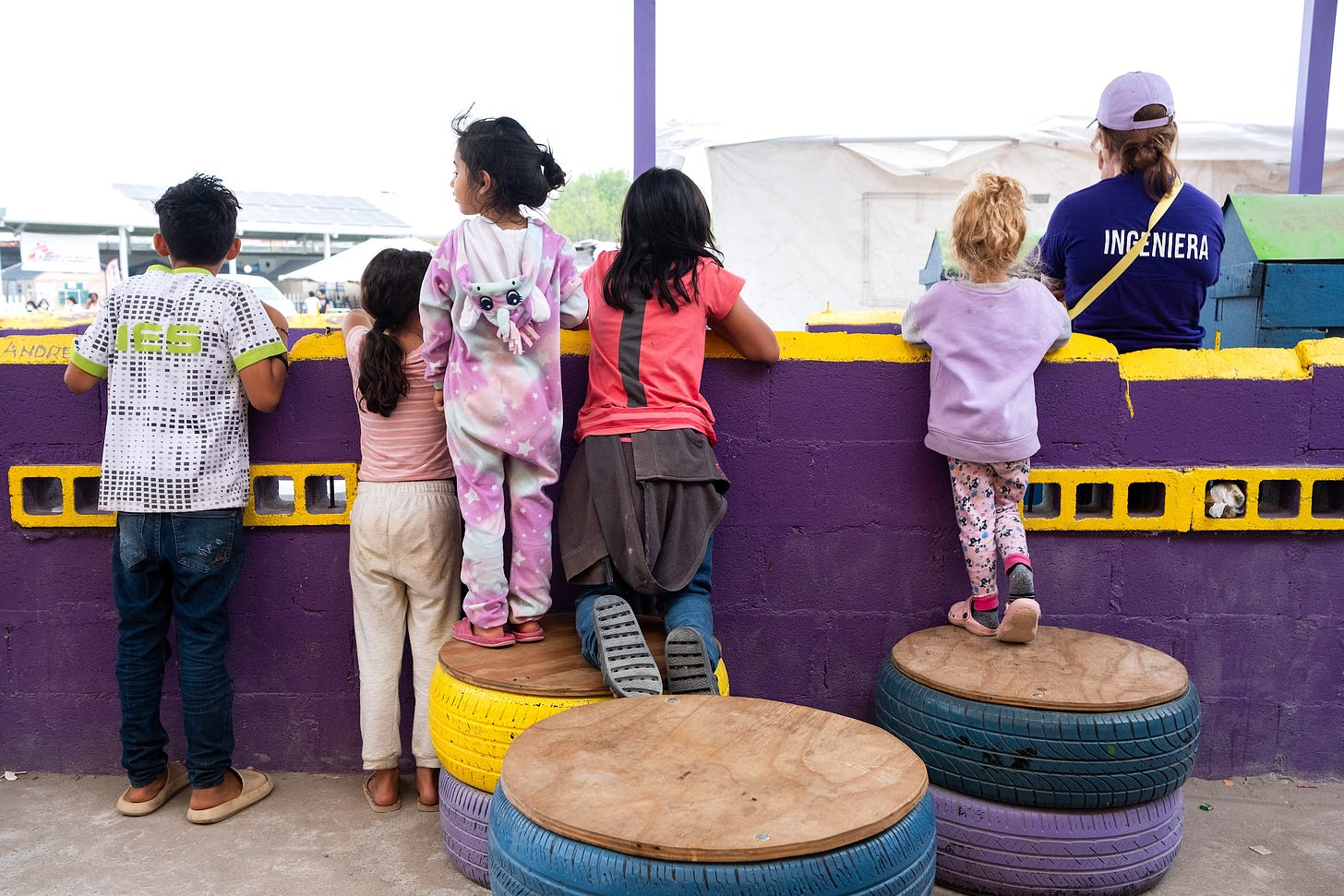
How do you maintain hope doing this full-time, not just you, but your whole team?
I really encourage our remote team to go down. It can get frustrating to be remote, when you get rejected for grants and read the news, it’s hit after hit, but when you go down and talk to people living there, distribute hygiene supples, then talk to MSF (Doctors without Borders) doctors who say, “You guys have been providing clean bathrooms and our rates of gastrointestinal issues have gone down,” or hearing from the women who didn’t have money to buy menstrual pads and you just gave them a pack of pads to get through the next month as they're tearfully hugging you, it’s amazing.
Last Friday we taught a STEAM class at Senda 2, and the kids were just ecstatic. All week these kids are coming up to our team, saying “When’s the next science class? When’s the next science class?” On Friday, they were running up, grabbing chairs, they were so excited. Seeing them learn and seeing them play on the playgrounds we built, it’s cool to see the immediate effect that we can have on people. It’s not just some desk job, some abstract idea. I'm providing clean water to these people and the doctors tell us people get less sick. You get tunnel vision when you're away from it too long, then when you come back, it puts everything in perspective — “YES! This is why I do it!”
There was this little girl after STEAM class, following me around holding my hand. She’s Haitian so I couldn’t even speak Spanish to her. I gave her a little toy and I made this little girl’s day, that’s all, it was worth the whole trip. I was so happy that I came down for this entire trip to hang out with this girl.
Our friend Tucker of MedGlobal in Matamoros said that one good thing that has resulted from our cruel immigration policies is the number of “badass women” who have stepped up to help vulnerable migrants. What are your thoughts on that?
That’s so nice of Tucker to think of us like that. It is interesting, I have thought about that. Yeah, Al Otro Lado, the Sidewalk School, Team Brownsville, Angry Tias, Lulu, Solidarity Engineering. We’re all women-led, which is so interesting. I don't know what that means, but it’s definitely interesting. I love partnering with all of these groups. We just all help each other out.
What’s an example of Solidarity Engineering collaborating with another NGO?
Tucker is planning a trip with MedGlobal to do an assessment in Tapachula and Villahermosa (in southern Mexico), essentially, just to kind of figure out if there's a need for a clinic and he was like, you know, it would be great if Solidarity could send someone and do a WASH assessment with me. And if there's a need, there's the potential for MedGlobal to open a clinic, maybe Solidarity could have a WASH specialist working out of that clinic.
How is Solidarity Engineering funded, and what are some ways people can help your work?
We get donations through the website, and you can send checks or donate through Givebutter, PayPal, Venmo and Patreon. And so a lot of our money comes in that way. The other way is that we apply for grants from foundations or companies.
If anyone is interested in helping write grants, that would be amazing. It’s time- consuming writing these applications and having help with that would be huge. You can donate a few hundred or a few thousand dollars or donate your time and write a grant that could be, who knows, $50,000 or $100,000. Think of what we could do with that.
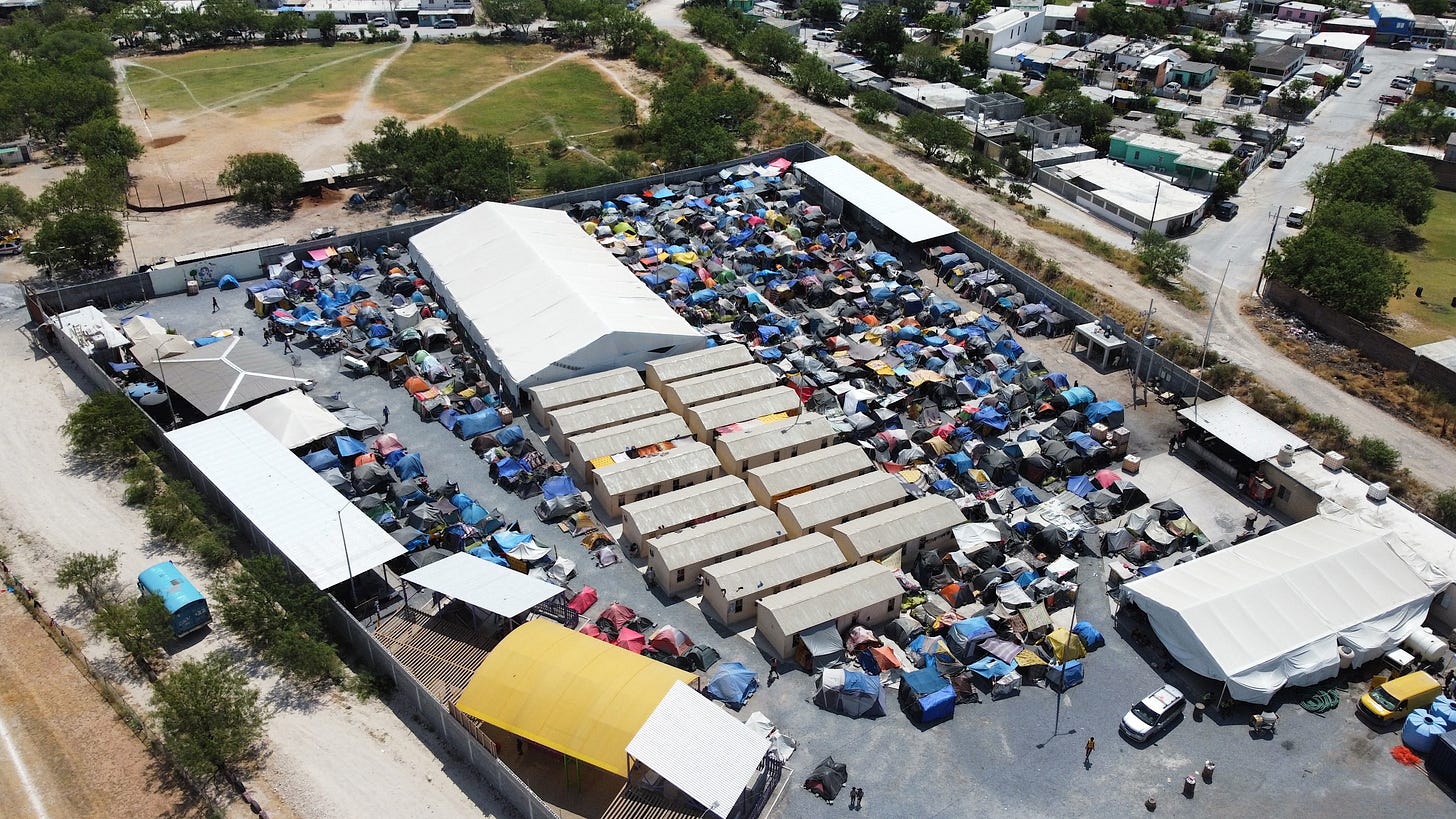
“In 2020, I was so flustered and frustrated, spinning my wheels. I had a good desk job, a good fit, and I kept going to protests every weekend. I was so frustrated, ‘This is not getting me anywhere!’ Getting down there and being at the camps day in and day out getting my hands dirty, it totally reinvigorated my life!” — Erin Hughes, co-founder and executive director, Solidarity Engineering.




What an amazing story! I never heard of this group! I'll have to go to their website and make a donation too!